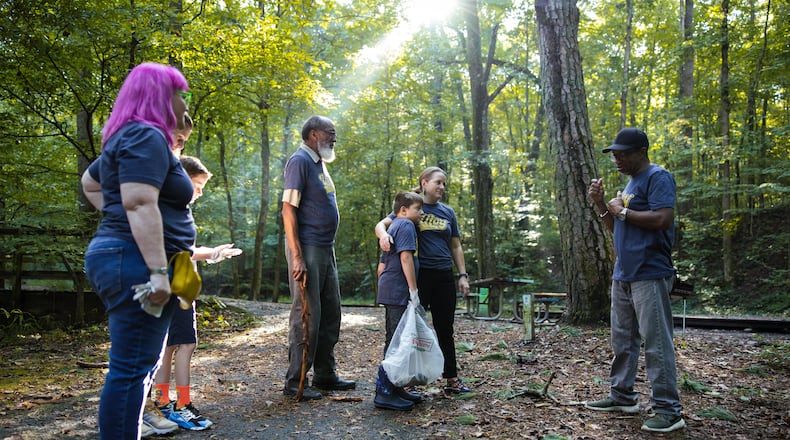Atlanta may be the city in a forest, but that forest is sustained by dozens of creeks and streams that flow into three rivers: the Chattahoochee, the Flint and the South.
Many residents may not realize they live among this network of waterways, which connect the city’s preserved green spaces, serve as wildlife corridors and help control flooding. The recently-launched Atlanta Creek League seeks to change that with a little friendly rivalry.
The league, which launched in August, invites people to join their local creek “team,” each belonging to one of the three river “divisions.” Teams compete for points by completing individual or group activities ranging from “take a nap by your creek” to reporting illegal dumping.
Winners get bragging rights and the proceeds raised from selling t-shirts and other merchandise go towards local watershed alliances and river keepers.
The Creek League was the brainchild of Atlanta writer Hannah Palmer, who asked, “Wouldn’t it be cool if people could really root for their creek? Like, really?” Palmer is the author of the book Flightpath, which explored the impact of Hartsfield-Jackson International Airport on surrounding communities. She is also a co-founder and project coordinator of Finding the Flint, a conservation group dedicated to the Flint River and one of the organizations receiving proceeds from the league.
“I just wanted to create something fun and inspiring that brought people together and was sort of silly,” Palmer said. “The goal of Atlanta Creek League is to raise awareness and get people activated around their creeks.”
The Creek League follows in the footsteps of other grassroots water conservation efforts, including Georgia’s Adopt-A-Stream program, the West Atlanta Watershed Alliance and the Chattahoochee Riverkeeper Neighborhood Water Watch Program.
Ben Emanuel, a director of the southeast region for American Rivers, a national nonprofit, said in addition to creating corridors of nature throughout the city, creeks and streams play an important role in managing runoff from developed areas.
“That’s becoming more and more important with climate change as rainfall becomes heavier and more intense,” said Emanuel. “Everything that happens on land impacts our streams ... so really, being stewards of our streams means conserving the lands that they flow through.”
The city of Atlanta has struggled to clean its waterways following a 1999 federal consent decree ordering it to upgrade its sewer and storm water systems. That work was supposed to be completed by 2014, but the deadline was extended to 2027. In 2016, the city was fined $378,000 for spilling more than 147 million gallons of sewage-tainted waste water into the Chattahoochee River and various creeks over the previous seven years.
The Creek League is still in its infancy, with several dozen newsletter sign-ups. Palmer is attempting to lead by example and recently gathered about a dozen neighbors on a group cleanup of Utoy Creek in Cascade Springs near her home in southwest Atlanta.
“About a dozen of us showed up with our t-shirts on, from senior citizens to children, including my children, and we just walked down to the creek and picked up trash early in the morning,” Palmer said. “I’m telling the people who show up at Cascade Springs on a beautiful Saturday, and they’re asking, ‘Oh, that’s the name of this creek? I didn’t know.’”
A note of disclosure
This coverage is supported by a partnership with 1Earth Fund, the Kendeda Fund and Journalism Funding Partners. You can learn more and support our climate reporting by donating at ajc.com/donate/climate/
About the Author
Keep Reading
The Latest
Featured



